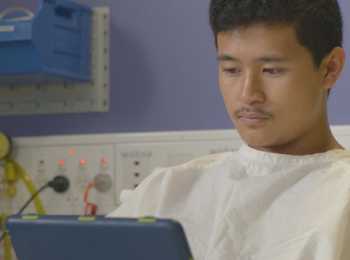Exams are always a crucial time in the life of young people, as they can hold a significant influence on the future opportunities that someone has. This can lead to a level of pressure that can easily become overwhelming. When exam stress is placed on top of a cancer experience, these feelings can be compounded
Sometimes, when we care about something deeply, we can exaggerate its significance. This can create unnecessary pressure for ourselves that can actually stifle our ability to do our best.
So, how can you shed exam stress during your cancer journey to ensure you give yourself the best chance of success? Here are a few tips and tricks for students to de-stress during exam time.
1. Develop your time-management skills - ‘Failing to plan is planning to fail’
Sometimes stress creeps in simply because we have so much to do, and we just don't know where to start!
If this is you, your first step is to plan out your responsibilities. 'Responsibilities' is used in plural here because study is only one part of life. You may need to devote time to other areas, such as household chores, spending time with family and friends, allotting periods for medical appointments or recovery, and doing activities that boost your wellbeing.
- Make a list of important upcoming commitments - medical appointments and social occasions, as well as assignments and exams. It may be helpful to pop these into a calendar or app so you can assign due dates.
- When in doubt, be generous with the time you block out for life tasks.
- If your mum, dad or a sibling has cancer, recognise that you may have less time to study if you are helping out more around the house.
- If you are going through a cancer experience yourself, block out any recovery days you anticipate you may need after treatment.
- Prioritise your study.
- You could choose to complete assignments in order of due date or by importance to your overall study/career goals.
- Or, focus your study on your weakest subjects first, allotting extra time for revision.
- Also plan rewards for completion of your academic and life goals. Celebrating little wins along the way is a great way to stay motivated (e.g. allow yourself a treat at the end of a revision chapter, or plan a night out with friends when a treatment or study cycle is finished).
- Then, add your academic commitments to your calendar, thinking about how you will prioritise your study:
- you could choose to complete assignments in order of due date or by importance to your overall study/career goals.
- you could choose to focus your study on your weakest subjects first, allotting extra time for study and revision or you could allocate the same study time for all subjects and work on them all simultaneously.
- Don’t forget about planning your rewards for completion of your academic and life goals. Celebrating the little wins along the way is a great way to keep motivated (e.g. reward yourself with a treat at the end of a revision chapter, or plan a night with friends when a treatment cycle is completed).
2. Manage your expectations - ‘Be kind to yourself’
You know that little voice in your head? That one that tells you, 'I'm not good enough' or 'I'll never get this finished". We ALL have that little voice, and we ALL have the ability to control it! Your thoughts influence your emotions and behaviour, so try to engage in positive self-talk during exam time.
The most important thing is to always be kind to yourself. Recognise that during your cancer journey you may:
- Have more difficulty concentrating, remembering information, or could be experiencing increased fatigue.
- Feel less motivated. Your future goals may have changed, or you may feel school is less important now because your health is taking priority.
If you are experiencing any of the above, it is important to reach out to your parents and school for support. Talk to someone you trust about how you are feeling and make sure to access available supports such as a School Personal Support Plan to access individual educational adjustments or 'special considerations', and/or an Education Access Plan to support those with interrupted schooling to receive university offers.
You may also want to give yourself a mantra, and repeat it when you are feeling under pressure:
"My best is good enough"
"I am capable of great things"
"I can create my own path"
Try to avoid BLACK AND WHITE THINKING and use a GROWTH MINDSET
Instead of: 'I can't do maths' try 'I am learning how to do maths'
Instead of: 'If I fail this exam I am doomed' try 'If I fail, I can try again
3. Get help if you need it - ‘It’s ok to ask for help. It just makes you stronger’
Struggling with your study? Why not get help? The thought of asking for help may be intimidating at first, but it might just be the step you need to take to achieve your goals.
You may find it helpful to note down on paper who is in your support network and keep it somewhere easy to find.
Ask yourself:
- 'Who can I talk to when I feel overwhelmed?' (e.g. You may want to include Mum, Dad or another family member.)
- 'Who are my supporters at school?' (e.g. A teacher you trust and/or a school guidance counsellor - write down their contact details.)
Also, think about what help looks like for you? Different people can help with different things:
- Do you need help with your motivation to study? You could set up a group study session with your friends or approach your teacher for some study tips or templates.
- Do you need help managing your general stress? There are lots of community supports you can access, via telephone, online, or in person
- Do you need help managing your general stress? When you are feeling overwhelmed, there are lots of community supports you can access, via telephone, online, or in person. These include:
- Kids Helpline -1800 551800 - https://kidshelpline.com.au/
- Lifeline - 13 11 14 - https://www.lifeline.org.au
- Headspace - https://headspace.org.au/
- Reachout - http://au.reachout.com/
4. Additional Resources - 'Work smarter, not harder
Check out some of these cool online resources and apps that can support your study journey:
- Todoist - https://todoist.com
Todist if a fully customisable project planner that allows individuals to input, track activity, and prioritise tasks. It is available on Android, iOS, and desktop. Todist is free with paid upgrades available
- ReachOut - https://au.reachout.com/articles/quiz-whats-your-at-home-study-style
Anonymous and confidential, ReachOut is a safe online platform where young people can openly express themselves, connect with others, and build resilience. Their ‘What’s your at-home study style’ quiz offers tips based on a student’s personal study style.
- iStudiez Pro - https://istudentpro.com/
Studiez Pro is one of the highest-rated planner apps designed for students. Enter your class schedule, including each teacher's name, contact info, and office hours. Then, you can colour code your classes and use icons to make it easy to scan. It is available on Android, iOS, and desktop. iStudiez Pro is free with paid upgrades available
- Smiling Mind App - https://www.smilingmind.com.au/smiling-mind-app/
The Smiling Mind app can help young adults manage stress and anxiety. It offers programs designed to help them learn meditation, resilience and empathy.
- Canteen's Education and Career Service - https://www.canteen.org.au/how-we-help/education-career-support
The Education and Career Service (ECS) helps young cancer patients aged 15-25 stay connected to study or work during and after their cancer treatment. It's a strength-based service that assists young cancer patients to identify their vocational goals and values, followed by individualised support plans to help them achieve their education or career milestones.
ECS support is currently delivered one-to-one and can be run in-person, over the phone, or via video conference. Group-based sessions are due to be run in the near future. Young people can use the service at the point of diagnosis, during treatment, and after treatment as they transition back into work or study.
Canteen's ECS consultants can help with:
- Keeping up with or taking a break from work or study.
- Job readiness skills, such as finding work, writing a résumé and job interview preparation.
- Reassessing study and/or career aspirations.
- Helping young people make informed decisions when it comes to finding a meaningful career.
ECS is available to all cancer patients aged 15-25, regardless of when they were first diagnosed.


















